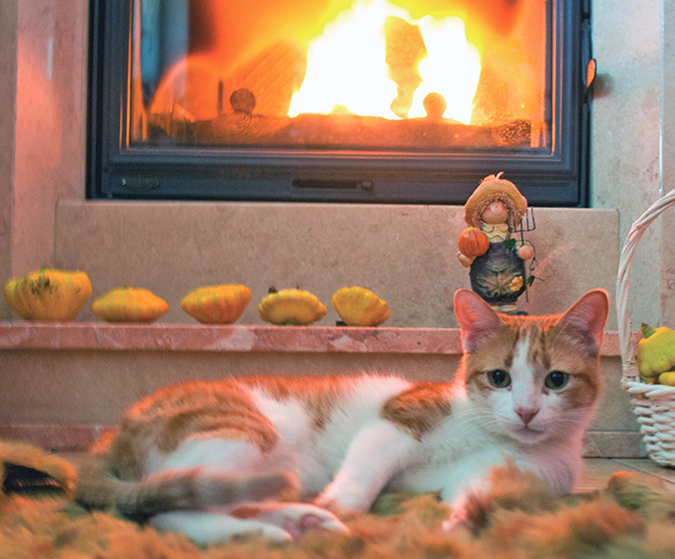1 Drafty, cold houses and shelters can be difficult for cats, especially young kittens and seniors used to a nice warm home. Make use of warm air rising, and consider higher retreats for your kitty. Bedding options that are off the floor will be especially appreciated, as long as they’re within jumping distance. If she usually enjoys looking out the window, add a towel to the windowsill for added comfort.
2 Cold, arthritic joints become more stiff when it’s cold, says Elisa Mazzaferro, MS, DVM, Ph.D., ACECC, Staff Criticalist, Cornell University Veterinary Specialists Adjunct Associate Clinical Professor of Emergency-Critical Care, Cornell University College of Veterinary Medicine. Many cats enjoy a heated pad. Choices include electric pads, microwaveable pads, and thermal pads, which are designed to capture the cat’s own body heat to make the pad warmer. If you do opt for an electric pad, be sure it won’t overheat, which can cause thermal burns, and always test the microwaved pad before giving it to your cat. If it’s hot to you, it will be too hot for your cat. As you work to keep kitty warmer, remember that a space heater may be attractive to your cat. Be sure he can’t inadvertently knock it over (some come with a safety switch that turns off if it falls). If you build a fire in your fireplace, use a fire screen to keep your cat from getting too close. Candles don’t give off much heat, but they’re used a lot during holidays and may attract your cat. “Cats may want to play with the flickering flame,” Dr. Mazzaferro says. “They can singe their whiskers and get second or third-degree burns on their paws. Candles can be knocked over, and melted wax can also cause serious burns.”
3 Consider where you’ve placed the litterbox. Many of us prefer to put the cat’s box in an out-of-sight location and, really, the cat prefers that privacy as well. But basements and garages can become chilly and damp, making your cat less inclined to use the litterbox. If you’re finding messes, give the litterbox location some thought.
5Check the garage. We know cats will seek warmth from a warm engine. Be sure you don’t run your car in the garage, and always check for your cat before you start the car if he has access to it. Be sure winter chemicals like antifreeze, de-icers, and cleaning fluids are away from the cat. Check to be sure your car doesn’t have an antifreeze leak. Antifreeze tastes sweet and tempting but is deadly poison. “It takes less than a teaspoon of antifreeze to intoxicate a cat. The minimal lethal dose for a cat is one-fourth teaspoon per kilogram (2.2 pounds) of weight,” Dr. Mazzaferro says.




